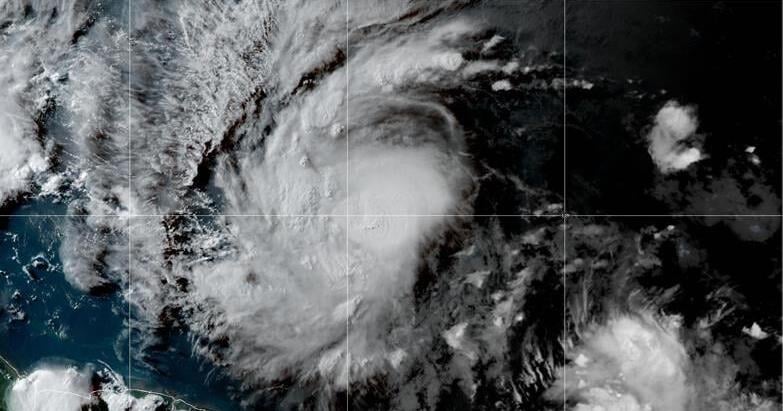SAN JUAN, Puerto Rico (AP) — Hurricane Beryl closed in on the southeastern Caribbean late Sunday after strengthening into what experts called an “extremely dangerous” Category 4 storm as government officials pleaded with people to take shelter.
The storm was expected to make landfall in the Windward Islands on Monday morning. Hurricane warnings were in effect for Barbados, St. Lucia, Grenada, Tobago and St. Vincent and the Grenadines.
“This is a very dangerous situation,” warned the U.S. National Hurricane Center in Miami, saying Beryl was “forecast to bring life-threatening winds and storm surge.”
Beryl was centered about 200 miles (320 kilometers) southeast of Barbados on Sunday evening. It had maximum sustained winds of 130 mph (215 kph) and was moving west-northwest at 18 mph (30 kph). It is a compact storm, with hurricane-force winds extending 35 miles (340 kilometers) from its center.
A tropical storm warning was in effect for Martinique and Trinidad. A tropical storm watch was issued for Dominica, Haiti’s entire southern coast, and from Punta Palenque in the Dominican Republic west to the border with Haiti.
Beryl is expected to pass just south of Barbados early Monday and then head into the Caribbean Sea as a major hurricane on a path toward Jamaica. It was expected to weaken by midweek, but still remain a hurricane while heading toward Mexico.
Historic hurricane
Beryl initially strengthened into a Category 3 hurricane Sunday morning, becoming the first major hurricane east of the Lesser Antilles on record for June, according to Philip Klotzbach, Colorado State University hurricane researcher.
It took Beryl only 42 hours to strengthen from a tropical depression to a major hurricane — a feat accomplished only six other times in Atlantic hurricane history, and with Sept. 1 as the previous earliest date, hurricane expert Sam Lillo said.
Beryl then gained more power, becoming the earliest Category 4 Atlantic hurricane on record, besting Hurricane Dennis, which became a Category 4 storm on July 8, 2005, hurricane specialist and storm surge expert Michael Lowry said.
“Beryl is an extremely dangerous and rare hurricane for this time of year in this area,” Lowry said in a phone interview. “Unusual is an understatement. Beryl is already a historic hurricane and it hasn’t struck yet.”
Hurricane Ivan in 2004 was the last strong hurricane to hit the southeastern Caribbean, causing catastrophic damage in Grenada as a Category 3 storm.
“So this is a serious threat, a very serious threat,” Lowry said of Beryl.
Reecia Marshall, who lives in Grenada, was working a Sunday shift at a local hotel, preparing guests and urging them to stay away from windows as she stored enough food and water for everyone.
She said that she was a child when Hurricane Ivan struck and that she doesn’t fear Beryl.
“I know it’s part of nature. I’m OK with it,” she said. “We just have to live with it.”
Forecasters warned of a life-threatening storm surge of up to 9 feet (3 meters) in areas where Beryl makes landfall, with up to 6 inches (15 centimeters) of rain for Barbados and nearby islands.
Warm waters are fueling Beryl, with ocean heat content in the deep Atlantic the highest on record for this time of year, said Brian McNoldy, a tropical meteorology researcher at the University of Miami.
Lowry said the waters are now warmer than they would be at the peak of the hurricane season in September.
Beryl marks the farthest east that a hurricane has formed in the tropical Atlantic in June, breaking a record set in 1933, according to Klotzbach.
“Please take this very seriously and prepare yourselves,” said Ralph Gonsalves, the prime minister of St. Vincent and the Grenadines. “This is a terrible hurricane.”
Bracing for the storm
Long lines formed at gas stations and grocery stores in Barbados and other islands as people rushed to prepare for a storm that rapidly intensified.
Thousands of people were in Barbados for Saturday’s Twenty20 World Cup final, cricket’s biggest event, with Prime Minister Mia Mottley noting that not all fans were able to leave Sunday despite many rushing to change their flights.
“Some of them have never gone through a storm before,” she said. “We have plans to take care of them.”
Mottley said all businesses should close by Sunday evening and warned that the airport would close by nighttime.
Across Barbados, people prepared, including Peter Corbin, 71, who helped his son put up plywood to protect his home’s glass doors. He said by phone that he worried about Beryl’s impact on islands just east of Barbados.
“That’s like a butcher cutting up a pig,” he said. “They’ve got to make a bunker somewhere. It’s going to be tough.”
In St. Lucia, Prime Minister Philip J. Pierre announced a national shutdown for Sunday evening and said schools and businesses would remain closed Monday.
“Preservation and protection of life is a priority,” he said.
Looking ahead
Caribbean leaders were preparing not only for Beryl, but for a cluster of thunderstorms trailing the hurricane that had a 70% chance of becoming a tropical depression.
“Do not let your guard down,” Mottley said.
Beryl is the second named storm in what is forecast to be an above-average hurricane season, which runs from June 1 to Nov. 30 in the Atlantic. Earlier this month, Tropical Storm Alberto came ashore in northeastern Mexico with heavy rains that resulted in four deaths.
On Sunday evening, a tropical depression formed near the eastern Mexico coastal city of Veracruz, with the National Hurricane Center warning of flooding and mudslides.
The National Oceanic and Atmospheric Administration predicts the 2024 hurricane season is likely to be well above average, with between 17 and 25 named storms. The forecast calls for as many as 13 hurricanes and four major hurricanes.
An average Atlantic hurricane season produces 14 named storms, seven of them hurricanes and three major hurricanes.

























